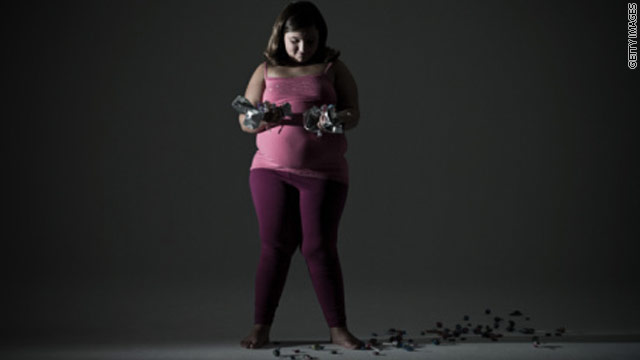Link
http://www.eurekalert.org/pub_releases/2003-10/apa-ocb100103.php- In the link above it talk about several studies about children who are obese have a high chance of having emotional problems that last until their adulthood. Obese boys and girls with low self-esteem have higher rates of loneliness, sadness and nervousness. These children were more likely to smoke and drink alcohol compared with obese children with normal self-esteem. Depression is often an outcome of low self-esteem and obese girls ages 13 to 14 are four times more likely to experience low self-esteem than non-obese girls. children who were teased about being overweight were more likely to have poor body image, low self-esteem, and symptoms of depression. The study found that 26 percent of teens who were teased at school and home reported they had considered suicide, and 9 percent had attempted it. Suicide is the third leading cause of death among adolescents.
Visual Arguments
The image above is about a little girl in a dark room looking at food deciding wether she should eat it or not. The darkness in the room might show that she is alone, sad, and depressed and the only ones to keep her company is the food that she eats. Eating your feelings away isn't the best way to get rid of depression thats why some people that suffer from it are becoming obese.
To some people this might be funny but to others its offensive. Obese people sink into these Stereotypes and make themselves feel useless to our society.
Quotes
"overweight people are also more likely to lose the psychological benefits of exercise."- This is true. If they feel rejected, unattractive, or suffer social discrimination, their emotions will get to them and instead of losing weight they may end up gaining weight. The problem then gets worse if they fail to lose weight and start blaming themselves for not losing weight.
"Obese children between the ages of 10 and 13 have an 80 percent chance of being obese adults"- This is a high percentage rate for obesity but once one gets comfortable with their weight and are not able to accomplish a weight lost goal they go back to their normal self and continue eating.
"There's an interaction between what's outside your body and what's inside. Obesity carries a large social stigma and may bring on depression"- If ones physical appearance looks good then you will continue to put nutritious and healthy things in your body to keep it like that but if you have don't like what you see in the mirror then you wouldn't care what you put in your body because you don't like what you see
Main Argument
Not so long ago, it was commonly believed that overweight and obese people were compulsive eaters, anxious, depressed, under stress, or trying to compensate for deficiencies in their lives. But today, when almost everyone seems to be getting heavier and obesity has become a national issue, both experts and the public are dismissing the idea that weight gain is a personal emotional problem.
Quotes
"overweight people are also more likely to lose the psychological benefits of exercise."- This is true. If they feel rejected, unattractive, or suffer social discrimination, their emotions will get to them and instead of losing weight they may end up gaining weight. The problem then gets worse if they fail to lose weight and start blaming themselves for not losing weight.
"Obese children between the ages of 10 and 13 have an 80 percent chance of being obese adults"- This is a high percentage rate for obesity but once one gets comfortable with their weight and are not able to accomplish a weight lost goal they go back to their normal self and continue eating.
"There's an interaction between what's outside your body and what's inside. Obesity carries a large social stigma and may bring on depression"- If ones physical appearance looks good then you will continue to put nutritious and healthy things in your body to keep it like that but if you have don't like what you see in the mirror then you wouldn't care what you put in your body because you don't like what you see
Main Argument
Not so long ago, it was commonly believed that overweight and obese people were compulsive eaters, anxious, depressed, under stress, or trying to compensate for deficiencies in their lives. But today, when almost everyone seems to be getting heavier and obesity has become a national issue, both experts and the public are dismissing the idea that weight gain is a personal emotional problem.


I think you should add pictures to your blog to strengthen your argument.
ReplyDelete-Maria Lino
This comment has been removed by the author.
ReplyDeleteThis comment has been removed by the author.
ReplyDeleteI think this is a great point of view on obesity! I think most people mainly focus on the physical damages that it may caues. I really like your arguments in this post, how obesity is becoming a national problem. I think it is great how you is giving people an insight on how being overweight can affect a person mentally. Addressing this issue will give more of an awareness. -Daisy Alatorre
ReplyDelete